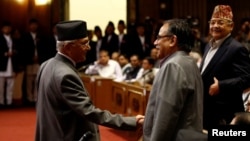India hopes the resignation of Nepal’s Prime Minister, K.P. Oli, will pave the way for a restoration of warm ties with New Delhi.
Oli had steered the Himalayan nation closer to China, which has been trying to increase its influence in South Asia. However, analysts say Beijing’s growing footprint in Nepal may be there to stay.
Oli resigned on Sunday just before a no confidence motion that could have toppled him. The two large groups that pushed for his removal, the Communist Party of Nepal (Maoist Center) and the Nepali Congress are expected to form a share power-sharing government with Maoist chief Prachanda becoming prime minister.
During Oli’s nine-month tenure, “China’s influence has definitely increased,” said Yubaraj Ghimire, an independent political commentator in Kathmandu.
Oli took power when anti-India sentiment was running high as Nepal blamed New Delhi for a five-month border blockade by ethnic protestors that created massive shortages and hardship in the landlocked country.
As the blockade turned the spotlight on landlocked Nepal’s critical dependence on India, rival China sent some fuel to ease shortages despite the difficult Himalayan terrain.
During a visit by Oli to Beijing in March, he signed energy supply and trade agreements and China agreed to allow Nepal to conduct foreign trade via its ports. Beijing also offered to improve road and explore building rail links over the high mountains to improve transportation links, which are minimal. China has already made substantial investments in infrastructure projects in Nepal.
Before resigning, Oli expressed concern that projects he began could founder. Some of his supporters blamed New Delhi for the political jockeying that forced him to step down.
In the Indian capital, Oli’s resignation has raised hopes about reversing the erosion in New Delhi’s influence.
“The anxiety that Nepal is drifting too close to China would perhaps be moderated,” said Sukh Deo Muni, an expert in South Asian affairs at the Institute of Defense Studies and Analyses in New Delhi. However, he cautions, “It would be foolish in New Delhi to expect that the Nepalese are going to give up on the China front. Therefore, a lot will be done by Delhi itself to bridge its alienation gap with Nepal.”
Political commentators in Kathmandu said while a new leader might restore a more balanced foreign policy, he will also continue build strong ties with China as anti-India sentiment is still high.
Many were angry with India for putting pressure on the Nepalese government to address the grievances of the Madhesi community, who led the border protests, complaining of insufficient representation in the country’s new constitution.
“The thing about China is that it directly operates through the government, it does not encourage anti-government activity,” said Yubaraj Ghimire. On the other hand, he said India has often been slammed in Nepal for meddling in the tiny country’s affairs.
Analyst Muni admits India faces a tough task to restore its once-dominant influence in Nepal. “It is a new country, it is a young country, it is an aspirant country. The whole concept of blockade has so strongly alienated young people of Nepal that you will find hard work to be done to win them back,” he said.









